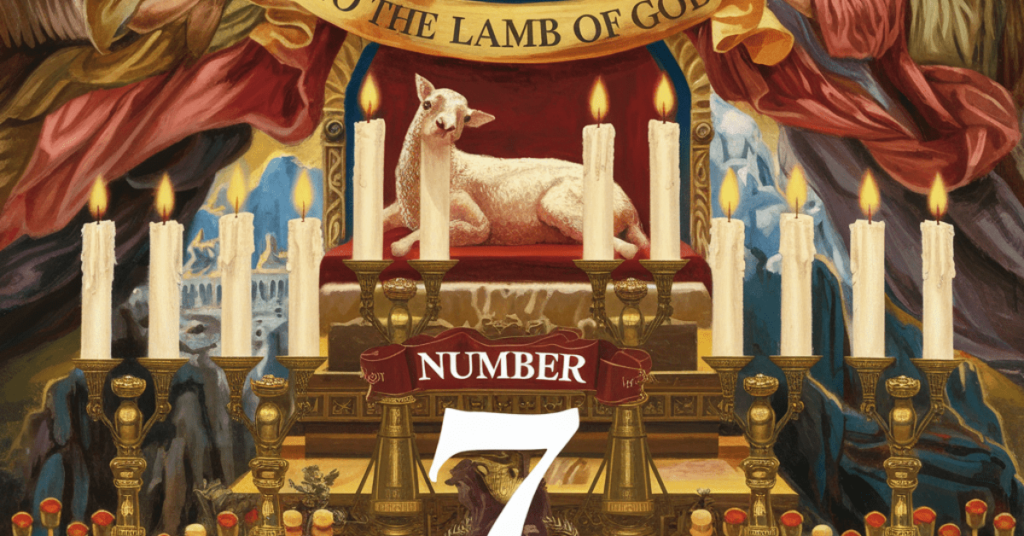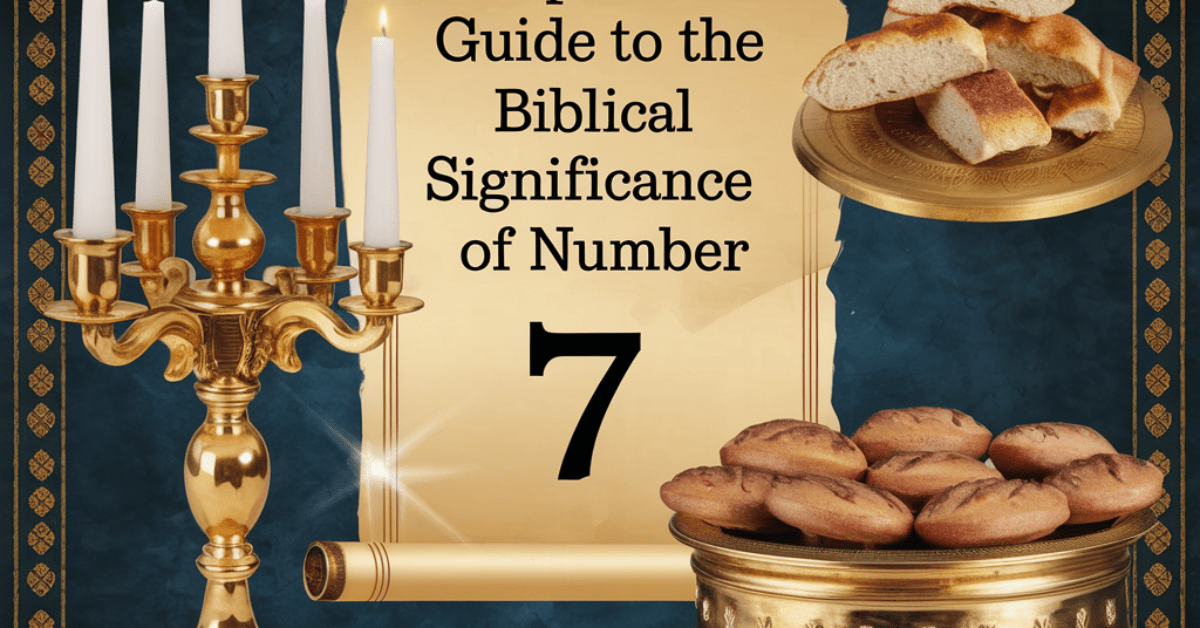Biblical meaning of the number 7 The number 7 holds a special place in many cultures. But its meaning in the Bible is especially profound. The number 7 is repeated throughout the Bible. It is a symbol of perfection. Perfection and sacred order From the Seven Days of Creation to the Seven Seals of Revelation. This number resonates deeply in the context of spiritual fulfillment.
In this complete guide, We will explore how the number 7 is used in various books. Of the Bible? Deeper meaning And why are they the cornerstone of Biblical numerology? By understanding the role of the number 7, we can open our understanding of God’s divine plan and the spiritual message it conveys.

Number 7 in the Bible: A Symbol of Perfection
One of the most famous Bible references to the number 7 is in the creation story. Genesis 1-2 tells us that God created the world in six days and rested on the seventh day. Which was the completion of His royal work? This work not only emphasizes the importance of the Sabbath but also directs its connection with the perfection of numbers.
Creation and rest:
The seventh day of rest is called the Sabbath. God declared His work to be complete today.
Flood and seven:
Noah was commanded to gather seven pairs of animals into the ark; additionally, it rained for 40 days and 40 nights. But it should be noted that the number 7 comes into play because Noah waited seven days before the flood began.
According to the seven times:
In Leviticus, we read that important events often occurred within seven days, such as the rites of sanctification or the Festival of Unleavened Bread, which lasted seven days
Number 7 in Bible Prophecy and Revelation
Moving from the Old Testament to the New Testament, the number 7 became more symbolic. Especially in the book of Revelation, the number 7 represents God’s judgment. The perfection of God’s plan and spiritual truth
Seven postures:
Revelation 5:1 describes a scroll sealed with seven seals. Each one represents a different aspect of God’s final judgment. These seals must be broken before God’s plan for humanity can be revealed.
Seven Churches:
The letters to the seven churches in Asia Minor in Revelation 2-3 indicate spiritual fulfillment in addressing the concerns of the early Christian church.
Seven Trumpets and Bowls:
In Revelation, seven trumpets are sounded and seven bowls of wrath are poured out. It symbolizes the final judgment of mankind (Revelation 8-11, 16).
Seven Spirits of God:
Revelation refers to the “seven Spirits of God,” which is interpreted as the fullness and perfection of the Holy Spirit’s work in the world.
Among other symbolic Bible references, seven
In addition to creation and prophecy, the number 7 appears in other contexts. of the bible It has the meaning of forgiveness, covenant, and cleansing of the soul…
Seven types of forgiveness:
Jesus teaches Peter to forgive not seven times. But seventy times seven represents unlimited forgiveness.
Seven Covenants equal to Abraham:
Genesis 21:28-30 describes Abraham making a covenant with Abimelech. They offered seven lambs as a token of their oath. This reinforces the use of the 7 in sacred promises and agreements.
Volume Seven Branches:
In Exodus, God instructed Moses about building a seven-branched candlestick (menorah) that was housed in the Tabernacle and later in the temple. According to the words of
Seven royal weddings:
In various scriptures, the number 7 is associated with consecration and ordination rituals. For example, altars were anointed with oil seven times to signify holiness (Leviticus 8:11).

The spiritual significance of the number 7 in the Christian life
The Biblical significance of the number 7 extends beyond its appearance in the Bible. to the spiritual practices and beliefs that are important to Christian life today
Sabbath and Rest:
Observing the seventh-day Sabbath is an observance that reminds believers of God’s plan and rest. It emphasizes the importance of pausing, reflecting, and restoring God’s presence.
Fullness and Perfection in Christ:
Christians believe that the number 7 not only symbolizes physical perfection. But also spiritual perfection. As seen in the death and resurrection of Jesus Christ. His sacrifice brought about the complete salvation of humanity.
Spiritual Growth in Seven Stages:
The Bible describes the process of spiritual growth and sanctification in stages or stages. This is often compared to a journey to spiritual fulfillment. For example, 2 Peter 1:5-7 lists seven qualities to develop in Christian character: faith, virtue, knowledge, self-control, patience, and godliness. Brotherly kindness and love
Number 7 in the Bible and sacraments
Rituals related to the number 7 are woven throughout the Bible. It emphasizes the sacred nature of the number 7. A notable example is in Leviticus. The ritual of cleansing and purification required the sprinkling of blood seven times (Leviticus 16:14). This ritual represents the complete cleansing of the soul and forgiveness of sins. The repetition of the number 7 indicates the completion of the cleansing process. Wash Ensures complete spiritual and sacramental completion…
In the same way, During the consecration of the priest, Seven sacrifices were offered to cleanse and purify the altar (Leviticus 8:11). This repeated use of the number 7 shows how important God’s perfection and acceptance are in worship.

The use of seven in Israeli celebrations and celebrations
The festivals that the Israelites celebrated also emphasized the importance of the number 7. In Leviticus, God commanded that it be the most important festival after Passover. Unfermented cake eating festival It was supposed to last seven days (Leviticus 23:6). The festival symbolized the Israelites’ deliverance from Egypt and their journey to the Promised Land. This concludes God’s covenant with His people.
Another important festival was the Feast of Tabernacles. Celebrated for seven days (Leviticus 23:34), the festival commemorated God’s law for Israel during their 40 years of wandering in the wilderness. The seven days are a time of worship, reflection, and gratitude for God’s sustaining grace. In these cases, the number 7 plays a role in reinforcing the theme of God’s redemption, provision, and fulfillment.
Seven days is a cycle of creation and a cycle of rest.
The creation story in Genesis is perhaps the most direct reference to the number 7 in the Bible. In six days, God created the heavens and earth. And on the seventh day, he rested (Genesis 2:2-3). This divine rest did not come from work. Rather, it is a symbolic act of declaring that His creation is complete, perfect, and good.
This cycle of work and rest shapes human life and emphasizes the importance of the Sabbath. The seventh day became a model of rest and worship. It is a time for people to stop and reflect on God’s finished work. The rhythm of six days of work followed by the Sabbath reflects not only the physical but also spiritual fulfillment. according to God’s pattern
Number 7 in Eschatology: Fulfillment and Divine Judgment
In the world of eschatology in the Bible Especially in the book of Revelation, the number 7 appears prominently as a symbol of God’s fulfillment and judgment. The seven seals, the seven trumpets, and the seven bowls all represent stages of God’s ultimate plan for mankind (Revelation 5-16). Each set of seven represents fulfillment. Whether it is the seven seals that reveal God’s judgment or the seven trumpets that herald important events leading up to the end times,.
The repeated use of the number 7 in Revelation emphasizes that God’s plan for the world will be fully fulfilled. Everything from the seven-headed dragon to the seven angels symbolizes the perfection of God’s will. For believers, this passage provides a warning and a promise that God’s plan will unfold as He has ordained. With ultimate justice and redemption.

7 numbers and the perfection of forgiveness
The number 7 in the New Testament is also associated with the idea of limitless forgiveness. When Peter asked Jesus how many times he should forgive his brother, He made seven suggestions. But Jesus replied, “I have not told you seven times, but seventy times seven” (Matthew 18:21-22). Here Jesus emphasizes the perfection and limitlessness of forgiveness, using the number 7 to demonstrate spiritual fulfillment in relationships.
This teaching reveals that forgiveness knows no boundaries. Like God’s grace, the use of the number 7 in this context emphasizes that true forgiveness is a reflection of God’s perfect and infinite mercy to His people.
FAQs
Why is the number 7 important in the Bible?
The number 7 is important because it represents hope, perfection, and orderliness in God’s plan. From the seventh day of creation until the prophecy in Revelation 7, it is used to indicate the consummation of a divine process or covenant.
How many times is the number 7 mentioned in the Bible?
The number 7 appears more than 700 times throughout the Bible. This makes it one of the most important numbers in Biblical Numerology.
What is the relationship between the number 7 and forgiveness?
In Matthew 18:21-22, Jesus taught that forgiveness is unlimited. By commanding us to forgive “Seventy times seven.” This reflects the symbolic meaning of the number as spiritual success and complete forgiveness.
What does the number 7 symbolize in the book of Revelation?
The number 7 in Revelation is related to God’s judgment and the fulfillment of God’s plan for humanity. It is visible through the seven seals, the trumpets, the chapel, and the bowl of wrath. They all symbolize the fulfillment of God’s final judgment.
Conclusion
The Biblical significance of the number 7 is one of its deepest spiritual symbols. which represents divine perfection completeness and the fulfillment of God’s promises It marks the end of the process from the Old Testament to the New Testament. and the beginning of rest, reconciliation, and spiritual renewal.
For those seeking deeper spiritual understanding, number 7 serves as a reminder of God’s fullness and the perfection found in His plan for humanity. Its appearance in Bible stories, prophecies, and spiritual teachings reminds us that, like the number 7, God’s work is flawless and perfect.

